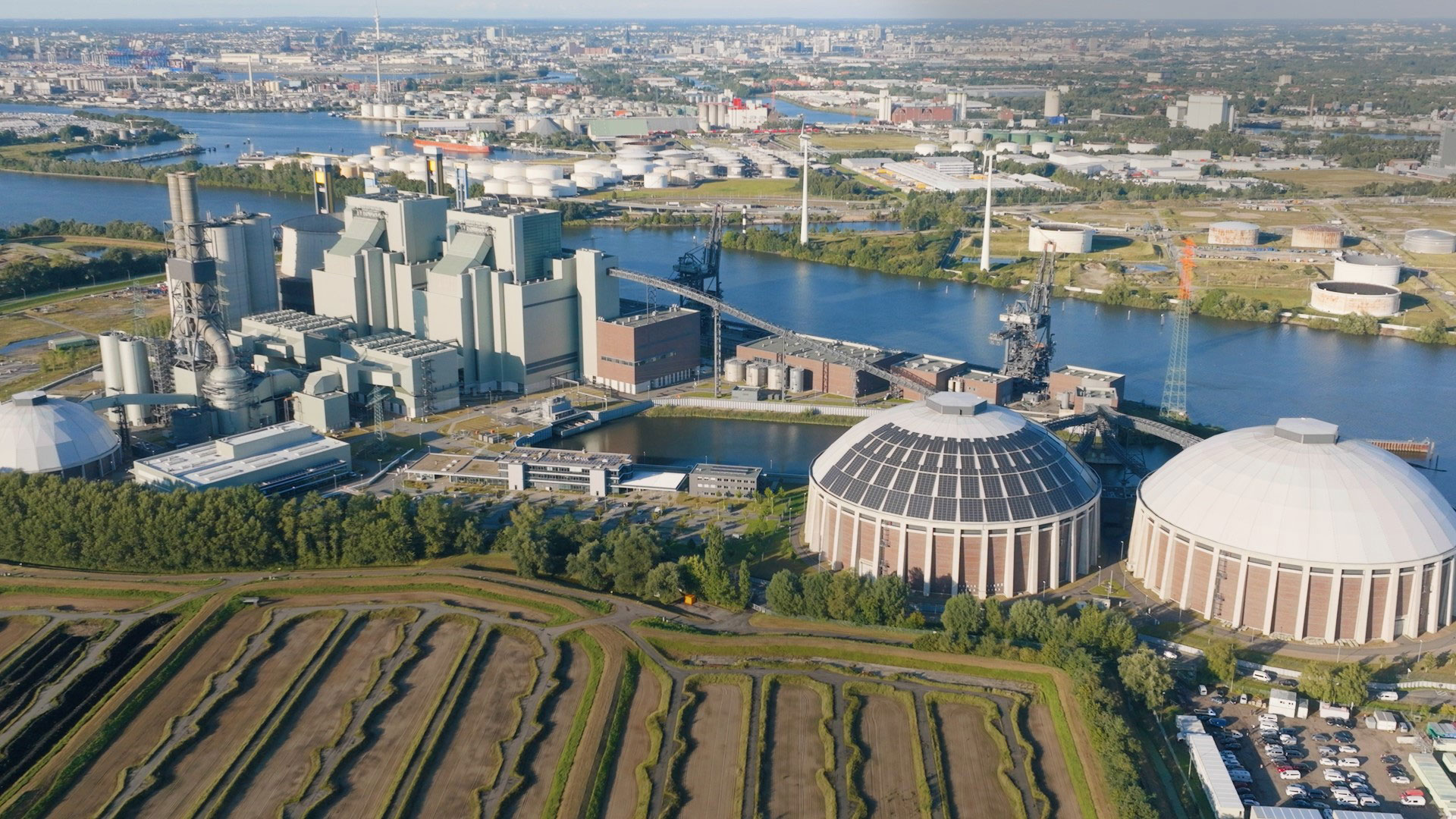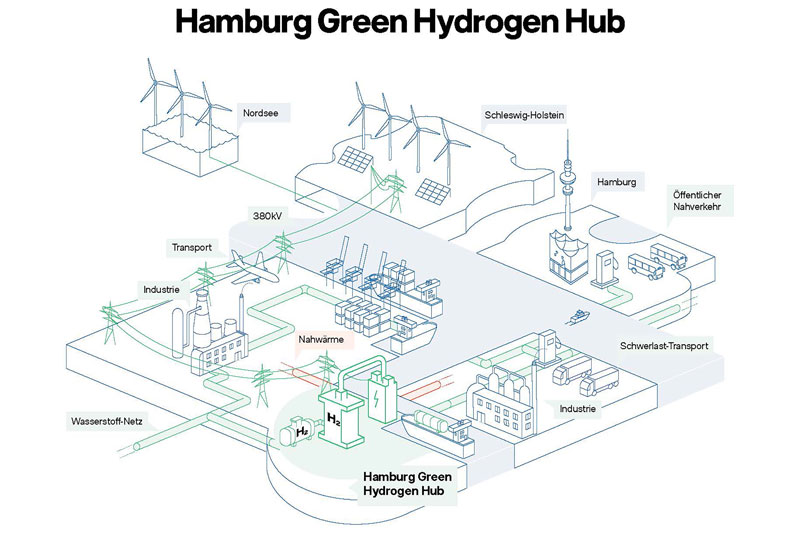Clean Allrounder
Research Project: The hydrogen innovation cluster Clean Port & Logistics (CPL) aims to achieve market maturity for the technology...

A 100 MW electrolyser is set to be constructed at the former Moorburg power station site. The Hamburg Green Hydrogen Hub consortium has recently undergone a restructuring and submitted an application for EU funding.
As early as June 2020, the Hamburg SPD and the Hamburg Greens, in their coalition agreement, committed to investigating and promoting the feasibility of sector coupling and the development of hydrogen production at the Moorburg site. In April 2021, Mitsubishi Heavy Industries, Shell, Vattenfall, and Hamburger Energiewerke (HEnW) signed a letter of intent to establish a 100 MW electrolyser there.
The initial confirmation for the four partners arrived at the end of May 2021, when the Hamburg Green Hydrogen Hub (HGHH) hydrogen project was selected as one of the 62 projects shortlisted by the German Federal Ministry of Economics and Technology for funding under the EU's Important Projects of Common European Interest (IPCEI) program.
In March of last year, a feasibility study, led by the Ministry of Economic Affairs and Innovation in close collaboration with the Ministry of the Environment, Climate, Energy, and Agriculture, was completed. The outcome: constructing electrolysis for green hydrogen production at the Moorburg site with a capacity of up to 500 megawatts is both economically and technically feasible. Certain sections of the existing power plant infrastructure provide excellent conditions for the construction of an electrolyser. This could be developed concurrently with a partial dismantling of the power plant and later expanded. Additionally, the suggested timeframe for commissioning by 2026 under the IPEIC funding process was deemed realistic.

In February 2023, Shell made the decision to exit the HGHH. Importantly, this move was not driven by the hydrogen business, which has historically played a pivotal role for the energy company. Shell has been involved in the construction of electrolysers for green hydrogen at the Shell Energy and Chemicals Park Rheinland (Refhyne I, Wesseling) and in Zhangjiakou (M4, China) and will continue to do so, with ongoing initiatives such as the realization of Hydrogen 1 in Rotterdam, housing Europe's largest electrolyser with a capacity of 200 MW. Shell is also actively engaged in various projects at earlier stages globally.
According to a spokesperson, the decision to withdraw from the Moorburg hydrogen project is not linked to the realization of the electrolyser in Rotterdam. In every project development, including the one in Hamburg, a comprehensive assessment is conducted, covering technical, safety, and regulatory aspects, as well as stakeholder support and financial considerations, before a decision is made.
Drawing on the knowledge acquired over the past two years and a comparison with similar aspects of other Shell hydrogen projects, the company has opted to step back from the Hamburg Green Hydrogen Hub in Moorburg and subsequently exit the HGHH consortium. "We have not taken this decision lightly and recognise that this is a disappointing moment for HGHH and Hamburg," said a company
spokesperson. "However, we continue to believe that Hamburg is an excellent location for a hydrogen hub and will remain an important element in our strategic thinking and planning for the development of a hydrogen economy in the future."
Upon submitting the IPEIC funding application to the German government, with the notification process expected to conclude by the end of this year, there was another change in the composition of the Hamburg Green Hydrogen Hub consortium in September. It now includes HEnW and Luxcara. Hamburg-based Luxcara is set to acquire Shell's and Mitsubishi's shares, pending approval from the Federal Cartel Office, resulting in a 74.9 percent ownership.
Nevertheless, Mitsubishi has expressed interest in continuing as a project partner in HGHH, reportedly only withdrawing from the consortium concerning equity involvement.
In March of this year, HENW acquired the former Vattenfall Moorburg cogeneration plant, taking over the company, its employees, buildings and remaining components, as well as the land on Moorburger Schanze.
„The HGHH project
is one of the
best hydrogen
projects in Europe"
Alexandra von Bernstorff
Managing Partner at Luxcara
With Luxcara, a partner with extensive expertise in complex sustainable energy infrastructure projects, has joined the consortium. Managing partner Alexandra von Bernstorff reports, "Since 2014, Luxcara has been developing profitable renewable energy projects without feed-in tariffs, making us one of the largest independent producers of green electricity in Europe." One notable example is the construction of "Önusberget," Europe's largest onshore wind farm with 750 MW in Sweden, set to be fully operational in June 2023.
The production of green hydrogen requires unsubsidized green electricity. Von Bernstorff mentions, "For this reason, we have been approached for many European hydrogen projects for about two years and have gained deep insights into the market."
Luxcara was among the first companies to focus on long-term, dedicated renewable electricity supply contracts, allowing the establishment of market standards and rendering power purchase agreements (PPAs) bankable. Von Bernstorff explains, "These long-term purchase and supply agreements provide the green power producer with a predictable revenue stream and offer the power consumer not only a stable electricity price but also a green power credential."
With over ten years of experience in the PPA/power market, the company comprehends the vital aspects of energy infrastructure projects. "Green hydrogen will be produced in Moorburg, in line with the Renewable Energy Directive's delegated act," von Bernstorff clarifies. "As a result, the HGHH project needs to sign PPAs that align with the renewable energy generation profile."
A profound understanding of green electricity and PPAs is crucial for green hydrogen production, benefitting both the project and hydrogen customers. Von Bernstorff affirms, "In our perspective, the HGHH project is one of the premier hydrogen projects in Europe." The Hamburg-Moorburg site is unique: "Much of the existing infrastructure can still be used, and potential customers are direct neighbors in the port, with whom the project is directly connected through the Hamburg hydrogen industry network." The team has been monitoring the project for several months, expressing longstanding interest in participating, regardless of Shell's and/or Mitsubishi's involvement.